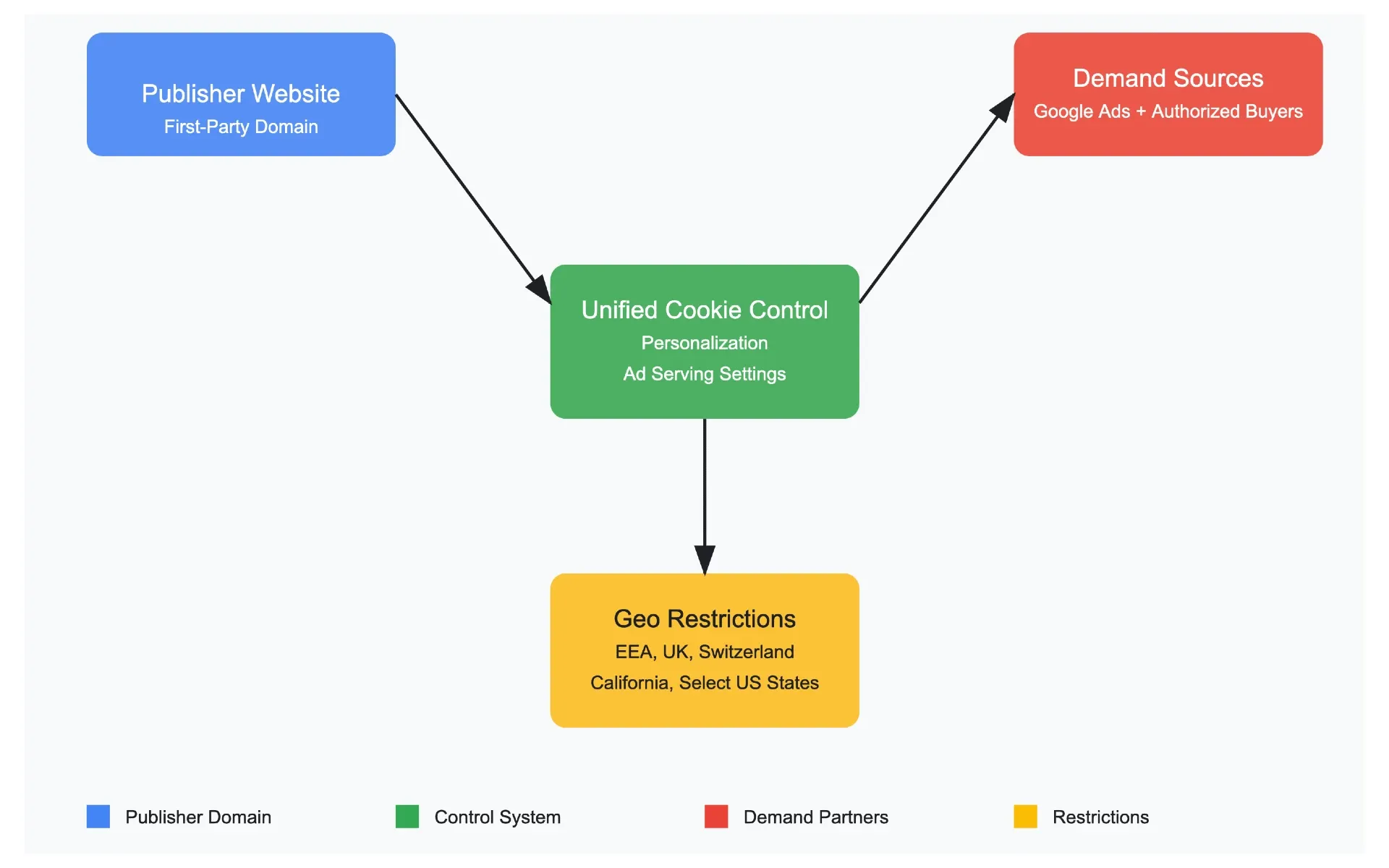Google AdSense unifies first-party cookie controls in major platform update
Google announces significant changes to AdSense first-party cookie management, affecting publisher controls and third-party demand access.

Google announced substantial modifications to its AdSense platform's first-party cookie management system on November 12, 2024, aimed at streamlining publisher controls and expanding access to third-party advertising demand. According to the official announcement from Google's AdSense Help Center, these changes will take effect no earlier than December 4, 2024, impacting how publishers manage user data and ad personalization.
According to Google's documentation, the platform update consolidates two previously separate controls - "first-party cookies" and "first-party cookies for personalization" - into a unified control mechanism. This technical modification simplifies the cookie management process while maintaining functionality. Publishers utilizing the AdSense platform will notice that the new unified control automatically adopts their existing personalization settings, ensuring a seamless transition.
First-party cookies, which are small text files associated with the domain users are visiting, serve critical functions in the advertising ecosystem. These cookies enable essential features such as frequency capping on advertisements and facilitate the delivery of personalized content when third-party cookies are unavailable.
Impact on Authorized Buyers Program
A significant aspect of this update involves the expansion of data sharing capabilities with Authorized Buyers. According to the announcement, publishers already implementing first-party cookies for personalization will have sharing with Authorized Buyers enabled by default. However, publishers utilizing first-party cookies without personalization will maintain their current sharing settings.
The geographic scope of this update includes notable limitations. According to Google's documentation, the sharing functionality will not extend to users in several key regions:
- European Economic Area (EEA)
- Switzerland
- United Kingdom
- California
- Select US states
Technical Implementation Details
The platform modification introduces several technical components affecting ad serving capabilities:
Invalid Traffic Detection
Publishers have the option to enable limited ads using invalid traffic detection cookies. This feature facilitates demand from both Google and Authorized Buyers on limited ads requests. According to the technical documentation, programmatic demand necessitates the use of invalid traffic detection-only cookies and local storage, regardless of user consent signals transmitted with limited ads requests.
Display Advertisement Modifications
The update affects several display ad parameters:
Similar-sized Display Ads
- Publishers can opt to show similar-sized but higher-performing display ads
- Modified ads appear centered at the top of ad units
- Example: 468x60 ads can appear in 320x50 ad units
Animated Display Formats
- Support for non-static display advertisements
- Includes Adobe Flash creatives
- Accommodates animated GIF formats
VPAID Implementation
The update maintains support for interactive VPAID (Video Player Ad-Serving Interface Definition) video advertisements, enabling:
- Interactive overlays
- Gallery implementations
- Various interactive video formats
The system explicitly excludes non-VPAID interactive video advertisements, such as TrueView video ads, from these controls.
Privacy and Compliance Considerations
The update maintains compatibility with existing privacy frameworks and regulatory requirements:
- European Union user consent policies
- California Consumer Privacy Act (CCPA) guidelines
- California Privacy Rights Act (CPRA) requirements
According to the documentation, these controls do not override established regulatory settings or existing lists of allowed ad networks within publisher accounts.
Platform Controls and Settings
Publishers maintain access to several critical controls:
Ad Technology Vendors
- Option to allow third-party vendors
- Potential for increased ad eligibility
- Possibility of enhanced earnings through expanded inventory access
User-Based Advertisements
- Control over ads based on user interests
- Management of demographic targeting
- Google Account information utilization
- Visitor information collection capabilities
The remarketing functionality remains unaffected by these changes, meaning publishers cannot opt out of showing advertisements to users based on their previous interactions with advertisers.
Key Facts
- Announcement Date: November 12, 2024
- Implementation Date: No earlier than December 4, 2024
- Affected Regions: Excludes EEA, Switzerland, UK, California, and select US states
- Control Integration: Combines first-party cookie controls and personalization settings
- Default Settings:
- Automatic sharing enabled for existing personalization users
- Sharing remains off for non-personalization users
- Technical Requirements:
- Invalid traffic detection cookies required for programmatic demand
- First-party cookies essential for frequency capping
- VPAID support maintained for interactive video ads
- Compliance Maintenance:
- Adheres to EU user consent policies
- Compliant with CCPA/CPRA requirements
- Maintains existing ad network allowlists

